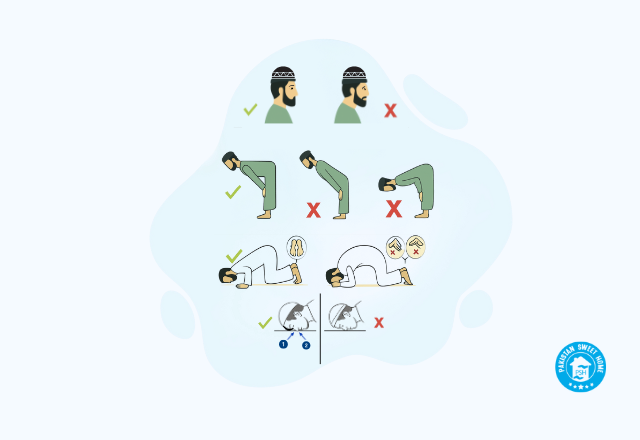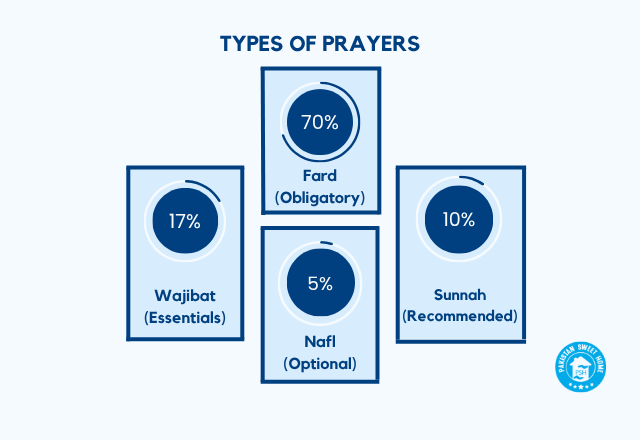We pray every day, yet many of us repeat the same unnoticed mistakes in Salah.
Rushed movements, wandering thoughts, or forgotten postures turn our moments of worship into routine actions. Over time, these small errors silently weaken the very bond that Salah was meant to strengthen.
It’s time to pause and reflect on how we stand before Allah, and what true prayer really means.
Let’s explore the common mistakes in Salah, their meanings, and how to realign our prayer with sincerity.
1. Serious Mistakes That Invalidate Salah
These are the gravest errors that destroy the essence of prayer.
- Abandoning Salah completely
Leaving Salah is considered disbelief (kufr).
The Prophet (ﷺ) said:
“Between a man and shirk and kufr is the abandonment of prayer.”
(Muslim)
- Delaying Salah beyond its time
Performing a prayer late without a valid reason is a major sin.
Allah (SWT) says:
“Indeed, prayer has been decreed upon the believers a decree of specified times.”
(Qur’an 4:103)
- Missing congregational prayer without excuse
Men capable of attending the mosque should not abandon jamaʿah (congregation).
The Prophet (ﷺ) said:
“Whoever hears the adhan and does not respond, there is no prayer for him except with an excuse.”
(Ibn Majah)
- Praying without tranquility (tama’neenah)
Rushing through Salah, the second pillar of Islam, invalidates it. Each position, rukuʿ, sujood, sitting, must be done calmly.
- Praying without humility (khushooʿ)
The heart and body should both be still. The Prophet (ﷺ) said that one may pray yet earn only a fraction of the reward because of a lack of focus and humility.
2. Mistakes in Following the Imam
Congregational prayer requires proper discipline.
- Moving before or after the Imam
Following the Imam precisely is wajib.
The Prophet (ﷺ) said:
“When he says takbeer, then you say takbeer; do not bow until he bows.”
(Bukhari & Muslim)
- Standing to complete missed rakʿahs before the Imam finishes tasleem
One must wait until the Imam completes both salaams before standing up to make up missed rakʿahs.
- Saying the intention aloud
Making niyyah (intention) aloud is an innovation (bidʿah). The Prophet (ﷺ) never declared his intention verbally before prayer.
3. Mistakes in Recitation
Correct recitation is essential for the validity of Salah.
- Not reciting Surah Al-Fatihah
It is a pillar of Salah. The Prophet (ﷺ) said:
“There is no prayer for the one who does not recite the Opening of the Book.”
(Muslim)
- Reciting Qur’an during rukuʿ or sujood
The Prophet (ﷺ) said:
“I have been forbidden to recite the Qur’an while bowing or prostrating.”
(Muslim)
- Poor or careless Qur’an recitation
Every Muslim should strive to improve pronunciation and clarity. The Prophet (ﷺ) promised a double reward for the one who recites with effort.
Changing pronunciation (e.g., saying anʿamtu instead of anʿamta) can alter meaning and invalidate prayer. Careful tajweed and practice are essential.
4. Physical and Posture Mistakes
These errors relate to how we position and move our bodies.
- Raising eyes to the sky or looking around
The Prophet (ﷺ), messenger of Allah, warned:
“Let those who lift their eyes to the sky during prayer stop, or their sight will not return.”
(Muslim)
- Turning the head unnecessarily
Looking around distracts the heart.
The Prophet (ﷺ) said:
“It is a theft which Satan steals from the prayer of a servant.”
(Bukhari)
- Sitting like animals or spreading arms on the ground
Avoid sitting on haunches like a dog or spreading elbows during sujood. The Prophet (ﷺ) forbade such postures.
- Wearing thin or see-through clothing
Men must cover from the navel to the knee, and women must cover their entire body, except for their face and hands. Transparent clothes invalidate Salah.
- Women not covering their heads or feet
A woman must wear a khimaar (head covering) and loose garments that conceal her body, including her feet.
- Lifting feet during sujood
Both feet must touch the ground; it’s part of the seven required limbs for prostration.
- Placing hands incorrectly
The Sunnah is to place the right hand over the left on the chest, not at the neck or below the navel.
- Raising hands at the wrong times
Hands should be raised only at the start, before rukuʿ, and when rising from rukuʿ, not during sujood.
- Not prostrating on all seven limbs
The Prophet (ﷺ) commanded:
“I was ordered to prostrate on seven bones: the forehead and nose, both hands, both knees, and the toes of both feet.”
(Bukhari & Muslim)
- Cracking knuckles during Salah
This is disliked (makrooh) and shows inattentiveness.
- Interlacing fingers during or before prayer
The Prophet (ﷺ) forbade clasping fingers while waiting or during Salah, as the worshipper remains in a state of prayer until he finishes.
5. Behavioral & Etiquette Mistakes
These reflect a lack of concentration and respect during prayer.
- Walking in front of someone praying
A grave sin, the Prophet (ﷺ) said it would be better to wait forty (days, months, or years) than pass before someone praying.
- Missing the opening takbeer when joining the congregation
The first takbeer (takbeeratul-ihraam) is a pillar. It must be made before joining the Imam in any position.
- Not joining the Imam immediately
If the Imam is in sujood or sitting, join him in that position; do not wait standing.
- Getting distracted by worldly matters
Let not business or entertainment make you forget prayer.
Allah warns:
“Let not your wealth or your children divert you from the remembrance of Allah.”
(Qur’an 63:9)
- Playing with clothing or watches
Such fidgeting breaks khushooʿ. The Prophet (ﷺ) forbade touching pebbles during prayer because it distracts from mercy.
- Closing eyes without reason
Not from the Prophet’s practice. It’s allowed only if open eyes cause a distraction.
- Eating, drinking, or laughing during Salah
All these invalidate the prayer.
- Reciting loudly and disturbing others
Moderation is required; recite softly enough to hear yourself without distracting those around you.
- Crowding others in rows
Causing inconvenience is sinful. Sit where there is space rather than stepping over people during Jumuʿah.
- Not straightening rows
The Prophet (ﷺ) said:
“Straighten your rows, for straightening rows is part of establishing the prayer.”
(Bukhari & Muslim)
- Neglecting to learn Salah properly
Ignorance leads to repeated mistakes in the prayer. Every Muslim must learn the rulings, conditions, and sunnah of Salah.
- Appointing an unqualified Imam
Leadership in prayer is for the one most knowledgeable in the Qur’an and piety.
- Men praying behind women in the Haram
Although space is tight, men should avoid lining up behind women unless necessary to maintain modesty and concentration.
- Women attending the mosque beautified or perfumed themselves
The Prophet (ﷺ) said:
“No woman who wears perfume should attend the night prayer with us.”
(Muslim)
Women are encouraged to attend the masjid modestly, without adornment or fragrance.
How to Avoid and Correct Mistakes in Salah
No one’s prayer is flawless, but awareness and sincerity turn every error into a step toward improvement. Islam’s mercy allows us to learn, correct, and grow through our worship.
Here’s how to protect your Salah and strengthen your connection with Allah (SWT):
1. Learn and Revive the Sunnah of Prayer
Study how the Prophet (ﷺ) prayed, from purity to posture. Authentic knowledge ensures that what we practice is worship, not habit. Attend lessons, seek guidance, and revise what you know regularly.
2. Value Every Prayer and Its Time
Treat each Salah as a meeting with Allah. Organize your day around prayer, not the other way around. Planning wudu early, setting reminders, and prioritizing the first adhan help preserve consistency and discipline.
3. Focus the Heart Before the Body
Before saying “Allahu Akbar,” take a moment to empty distractions. Reflect on the verses you recite and imagine standing before your Creator. True khushooʿ begins with intention and mindfulness.
4. Maintain Cleanliness and Modesty
Clean attire, a covered body, and a pure place reflect respect for Salah. Purity of body mirrors purity of soul, a reminder that prayer is not only about movements but inner reverence.
5. Preserve Calmness and Order
Perform each movement with composure and follow the Imam in harmony. Stillness of the limbs nurtures stillness of the heart. Remember: haste steals the soul of prayer.
6. Respect the Space of Others
Use a sutrah when praying alone, avoid crossing in front of others, and keep your recitation moderate. A quiet, undisturbed environment preserves humility and mutual respect in worship.
7. Correct Forgetfulness with Sujud As-Sahw
Mistakes happen, even to the best of worshippers. When you forget a step or doubt a rakʿah, perform the two sujoods of forgetfulness as the Prophet (ﷺ) taught. It is not a flaw but a beautiful reminder of human imperfection and divine mercy.
8. Keep Learning and Guiding Gently
Knowledge is ongoing. When you see someone err, correct with kindness, and accept correction with humility. A sincere reminder can purify both hearts, the one who gives it and the one who receives it.
9. Strengthen Salah Through Reflection
After each prayer, pause for a moment of dhikr or self-review. Ask: Was I present? Was I sincere? Small daily reflections create lifelong improvement.
Salah is perfected not by perfection, but by persistence.
Every mindful prayer brings you closer to the mercy of Allah, one correction, one sujood, one intention at a time.
In conclusion, Salah is not merely a ritual; it’s the believer’s spiritual heartbeat, a direct link to Allah (SWT). Every bow, every prostration, is a reminder of our submission and gratitude. By avoiding these common mistakes in Salah, we preserve the purity of our worship and strengthen our connection with the Creator.
Let us strive to perfect our prayers, teach others gently, and always remember the Prophet’s (ﷺ) words:
“The first deed that the servant will be called to account for on the Day of Resurrection will be the prayer. If it is good, then the rest of his deeds will be good.”
(Tabarani)
At Pakistan Sweet Home, every child is nurtured not only with care but with faith. Through daily Salah, they learn discipline, gratitude, and the value of connecting with Allah (SWT) from a young age. Supporting an orphanage in Pakistan like PSH means helping these children grow into confident, God-conscious individuals who carry the light of prayer in their hearts.
Share Blessings With Orphans

info@pakistansweethome.org.pk
(051) 4865856
+92 335 1118477













